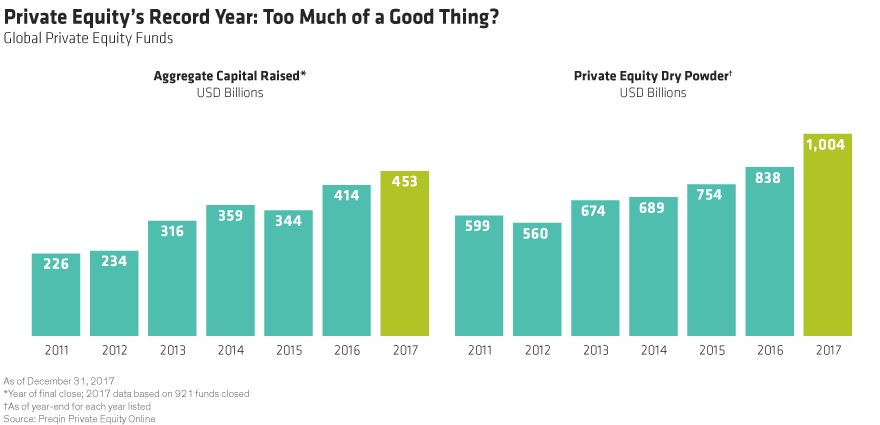Disruption abounds, but will it matter to the markets?
by Kristina Hooper Global Market Strategist, Invesco Ltd., Invesco Canada
For the past year, I’ve been talking about disruption as a key theme for the markets and economy. During the past week – with the shutdown of the U.S. government, continued efforts to form a coalition in Germany, and an Olympic agreement coming out of the Korean peninsula – it’s become clear that the theme of disruption remains front and center. Particularly geopolitical disruption.
The U.S. government shuts down – will stocks react?
As I write this, the U.S. is experiencing a government shutdown, but there are reports that a short-term spending bill may be approved shortly to fund the government through February 8. Shutdowns have become a fairly common phenomenon in America. There have been 18 government shutdowns of varying lengths spanning every presidency since Gerald Ford – with the exception of George W. Bush. While the longest shutdown was 21 days (which occurred during the presidency of Bill Clinton), most are much shorter. The most shutdowns occurred during the presidency of Ronald Reagan – he presided over a grand total of eight.
Government shutdowns suggest a high level of political dysfunction but, like most geopolitical risks, typically have little in the way of lasting impact on financial markets. In fact, based on my review of stock market performance during past shutdowns, it seems that markets are becoming de-sensitized to this particular brand of disruption as investors become increasingly familiar with the process of closing and reopening the government. Stocks typically fell during shutdowns in the 1970s and 1980s, but they were typically flat or moved higher during more recent shutdown periods. While the current shutdown is unusual in that one party controls both the executive and legislative branches of government, I still expect it to be rather toothless – i.e., it should have no lasting impact on the stock market.
Germany and France seek political connections
Meanwhile in Germany, Chancellor Angela Merkel has advanced in her attempts since September to form a coalition government. After failing last fall to unite the pro-business and environmental parties in a coalition government, Merkel has been attempting to woo an old partner – the Social Democratic Party (SPD). Although the SPD had previously sworn off another coalition government with Merkel, party leaders voted on Sunday to begin coalition talks with Merkel’s party. While I believe this is a positive development, it is far from a done deal. The party is merely committing to talks – nothing more. There is still the potential that attempts could fail and a snap election must be called in Germany. Thus far, the German economy and financial markets have not fretted about what has become the longest post-election period without a government being formed since World War II. I believe that – as long as the global economy continues to show solid growth – this will remain the case even if snap elections need to be called.
While Merkel has been focusing inward as she works to form a government, it appears that France’s relatively new president, Emmanuel Macron, has increasingly been focusing outward. This began with Macron’s speech in September articulating ambitious reforms for the European Union (EU). Last week he met with U.K. Prime Minister Theresa May to discuss Brexit. There are a few takeaways from this meeting. First, the EU does not seem interested in creating a bespoke relationship with the U.K., but instead would like it to choose an off-the-shelf model – patterned after the Norway-U.K. relationship or the Canada-U.K. relationship. Second, it seems that Macron is not only the leader of France but is now the unofficial leader of the EU given Merkel’s vulnerability in her home country.
The Olympics bring North and South Korea together – for now
The winds of geopolitical change, if strong enough, can result in the destabilization of institutions and the shifting of alliances. One unusual development that has emerged in recent weeks as a result of heightening tensions between the U.S. and North Korea is an improving relationship between North Korea and South Korea. While they are nowhere near peace and harmony, they are engaging in talks and, in a surprising move, have decided that their respective athletes will march together in the upcoming Olympics under one flag.
I will need to see more progress before I suggest we are watching a modern-day Berlin Wall coming down. It may be that this is North Korea’s attempt to rebuke China for more strictly enforcing the United Nations-imposed trade sanctions on North Korea. (China does not want to see a reunification of Korea, as it could become a far more formidable economic superpower.) Supporting this thesis is that in recent days the U.S. has praised China for cooperating with sanctions while excoriating Russia for violating them.
This week: NAFTA talks resume
As I have stressed in the past, the greatest market risk posed by geopolitical disruption is that protectionism could impact trade. Protectionism can be a powerful headwind to economic growth, which means it can also negatively impact the stock market. We can’t forget that many economists blame protectionism for exacerbating the Great Depression in the 1930s, and we can’t ignore the threat of protectionism that is very real today.
This week North American Free Trade Agreement (NAFTA) talks resume in Montreal, on the heels of a recent tweet from U.S. President Donald Trump calling NAFTA a “joke.” While there is much posturing going on, it seems likely that NAFTA talks will continue without resolution for some time. Mexico is holding national elections this summer, and it’s likely that talks will be suspended in advance of the campaigning. In my opinion, the best-case scenario is that talks end sooner rather than later, and that all three parties move forward with a modernization of the 25-year-old trade agreement. However, modernizing NAFTA will likely take much time – hence my conclusion that talks are likely to drag on for many months. Also, even if the U.S. chooses to withdraw – which I believe is the worst-case scenario for the three economies – it’s worth noting that withdrawal from NAFTA requires a six-month advance notice. So we will all have time to digest potential bad news.
Key takeaways
In summary, tensions are rising in a variety of places around the world. However, geopolitical disruption typically doesn’t impact markets unless it becomes extreme. And even then, the impact is usually short-term in nature – typically a drop in the stock market and a drop in the yield on the 10-year U.S. Treasury, and maybe even an increase in the price of gold. The exception to that is protectionism, which can impact trade, economic growth and financial markets, but more through a slow erosion process, as opposed to a swift snap.
We can’t ignore that disruption can often unleash opportunities as well, as the economist Joseph Schumpeter noted about economic innovation and the business cycle. I believe the theory of creative destruction can also be applied to geopolitics: The “gale of creative destruction” can unleash positive forces around the globe, creating new political parties and institutions that may be more effective and supportive of economic growth.
I look to France as an encouraging example of that: Last year at this time the country was mired in discord, with powerful extremist movements on the right and left raising concerns about who could possibly unite such a fractured nation, especially given growing fatigue with the traditional two-party system. Emmanuel Macron created a new political party and, within the course of a year, was elected president and saw his party win a majority in Parliament. This week he is hosting business leaders at a pre-Davos World Economic Forum summit in order to promote France as a business-friendly destination – an assertion that would have been viewed as fairly absurd a few years ago.
And we can’t forget that bitcoin was born and grew in usage because of geopolitical disruption. Had there not been a global financial crisis and a Greek debt crisis, I don’t believe there would have been as great an appetite for a digital currency that is completely devoid of government involvement – as well as private bank involvement. These two crises were so disruptive that they bred distrust of both governments and banks, which opened the door to a cryptocurrency made possible through the use of an incredibly innovative and ground-breaking technology: blockchain.
While Macron has certainly had his missteps, and while bitcoin is a very flawed currency alternative, both represent new ideas and new opportunities. And so perhaps the 19th U.S. government shutdown may be the start of the creation of a third political party in the U.S. – or it could cause the development of a different way of negotiating funding of the government. Or it could just create more market volatility. However, if an investor has a long time horizon, it shouldn’t matter.
Subscribe to the Invesco Canada blog and get Kristina Hooper’s market reviews in your inbox.
This post was originally published at Invesco Canada Blog
Copyright © Invesco Canada Blog














